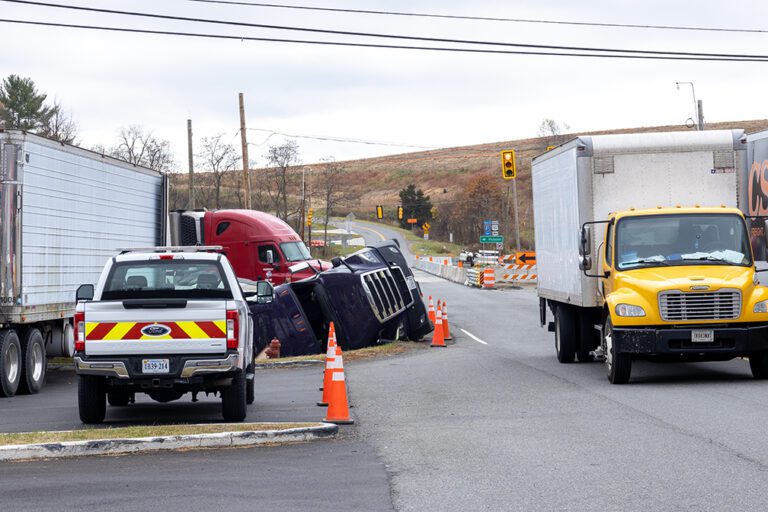In February, Brad Klepper shared tips to help drivers make the best of a bad situation during a traffic stop. This column can be viewed here.
This month, we are going to delve a bit deeper than a simple traffic violation.
If you are in an accident, always keep in mind your own protection. Typically, if you do not feel you are at fault, your instinct is to cooperate fully with an officer — but you still need to be careful what information you volunteer.
Let’s say you’re involved in an accident that results in serious injuries to another individual but no fatalities. Your immediate reaction is to cooperate fully. After all, most professional drivers have nothing to hide. An officer starts asking questions and you respond, thinking you’re being helpful. But, let’s say, three days later the injured person dies, and the prosecutor decides to file a vehicular homicide charge against you. Everything you said at the scene will be brought up in court. The slightest things that you merely commented on could be turned around and used against you.
If you are involved in an accident, one of the first things you should do is call your company to report the accident and ask them what they want you to do. You may want to check out the situation for yourself and collect information that could be helpful for your own cause, but in all cases follow their instructions on what to do. Remember, you may be excited or scared, but the company has written steps they want you to follow. The safety department’s job is to handle accidents. This may be the only time in your life you are involved in an accident, so follow their instructions.
Snap some pictures of the surroundings, including the vehicles and the people present who were witnesses. You want a picture of every car tag and person at the scene, if you can get it; you never know what they saw. Next, collect potential witnesses’ names and phone numbers. I must caution you here: Do not try to talk to these people about the accident. Professional drivers are not trained in interviewing witnesses, and you don’t want to take the chance of actually hurting your own case. You simply want names and numbers so your company and the defense lawyer can talk to them if necessary. But remember — always follow your safety department’s directions.
While some of this may seem extreme, you simply never know when a basic traffic stop or an accident, major or minor, will land you in court defending yourself and your future livelihood. Collecting certain pieces of information when in these situations will help to protect you if that ever happens.
The importance of roadside interactions
In the course of defending drivers, I see a lot of violations noted on a citation that could probably have been avoided. What do I mean? Well, I am glad you asked.
Now understand: My opinion is based solely on what I have seen in my practice — but in my opinion, the reason we are seeing “additional” violations noted on a citation is because of poor roadside interactions with enforcement. I can see it in the way the citations are written.
OK, I can hear it now — “How do you know that, smarty pants?”
Well, here is my answer: I have been contesting citations and inspections for quite some time. As a result, I generally know how the officer can write a citation. For example, if you bypass a port of entry in New Mexico you can receive a citation for bypassing a port of entry, failure to obey a traffic control device, or other violations. If the officer wrote you a citation but only listed one violation, I know he cut you a break in the field and you had a good interaction. Two violations maybe not quite as good an interaction, but probably still OK. If there are more than that, I know it did not go well.
The same can be said for inspections. Assuming you are driving a reasonably maintained vehicle, a couple of violations can be normal. If there are more than five I begin to take notice — more than 10 and I am concerned. If there are more than 30 (yes, I have seen that), I know somebody said something about someone’s momma. Don’t do that.
The importance of NOT being memorable
In addition to reading citations like tea leaves, I also talk to enforcement and prosecutors on pretty much a daily basis. My conversations with them confirm that I am not making this up.
In fact, do you know what the best thing is an officer can say to me when we are discussing a case? It is easy: “I don’t recall your client.” If I hear that, I know everyone acted professionally, and our chances of getting a positive outcome go up. In contrast, when I hear “Yes, I remember your client. Let me tell you what happened,” I know I am in for a long day.
So, the next time you have an interaction with enforcement, please remember that the officers are just doing their jobs. They are not targeting you specifically, although I know it can feel this way. They are out to keep the roads safe so you can do your job and everyone else can do theirs.
I am sure that if you took a survey of enforcement, writing tickets and doing roadside inspections is not at the top of the “favorite things to do” list. But it has to be done. Why? Because there are people out there on the highways that are truly unsafe and need to be taken off the road. Unfortunately, no one labels the side of their truck with a logo that says, “Unsafe Trucking LLC” or “Unsafe Driver.” Stops have to be made, inspections have to be performed and citations have to be written.
This is where the professional part of being a professional driver comes into play. Do not take it personally. Do not make it personal. Do not bring anybody’s momma into the conversation. Be prepared, be courteous, be polite and most importantly, be professional. Understand that this is where we begin defending your citation.
Also understand that everyone is entitled to have a bad day, even law enforcement. You know how you feel when a four-wheeler cuts you off? Or when you are trying to solve a problem at home from 1,000 miles away? My point is that the officers are people, just like you — trying to do their job, provide for their family and deal with all the complications that life brings. Extend them the same courtesy you want to be extended to you. I promise, this will make everything go better and get you back on the road quicker.
At the end of the day, you cannot always control the circumstances of a stop. You cannot control the mood of the officer stopping you. You cannot always control the violations that may be discovered. What you can control, however, is your attitude and demeanor when dealing with the officer. Please remember that sometimes it is best not to be remembered!
Brad Klepper is president of Interstate Trucker Ltd. and is also president of Driver’s Legal Plan, which allows member drivers access to services at discounted rates. For more information, contact him at 800-333-DRIVE (3748) or interstatetrucker.com and driverslegalplan.com.
Brad Klepper is a regular contributor to The Trucker, providing valuable insights for drivers and motor carriers. He serves as president of Drivers Legal Plan, a national law firm offering discounted CDL ticket defense to members, and Interstate Trucker, a law firm providing CDL defense with no monthly fees.








